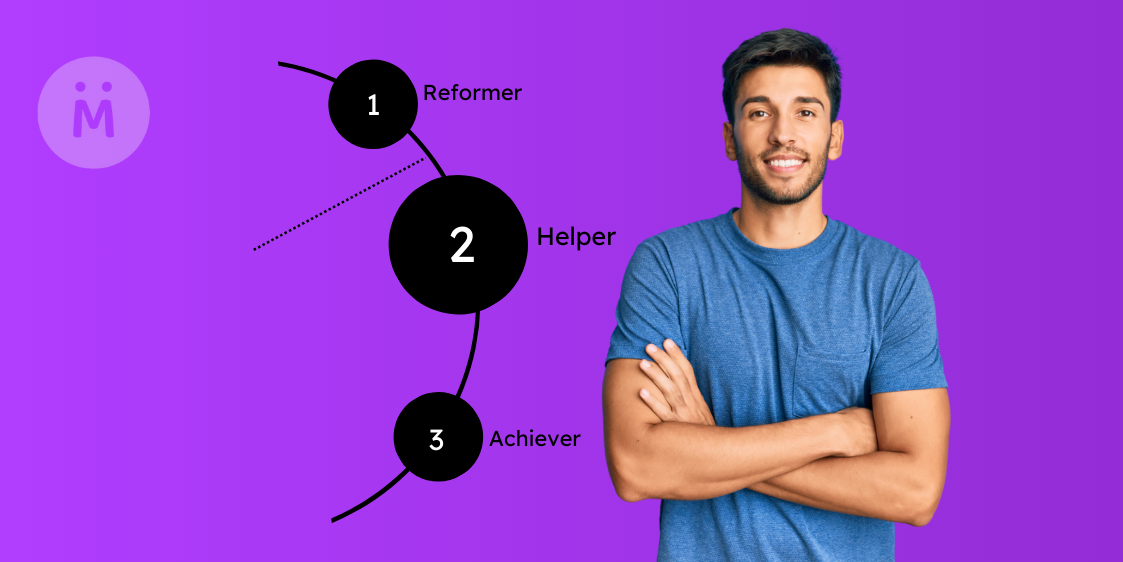Understanding Enneagram Type 2: The Helper
Margo Plater

Your Unique Qualities as an Enneagram Type 2
- Empathetic and Compassionate: Enneagram Type 2s are known for their high levels of empathy and compassion.
- Generous: These individuals have a natural inclination to give and support others.
- Warm and Affectionate: Enneagram Type 2s are warm-hearted and affectionate individuals.
- Selfless and Altruistic: The Helper's primary motivation is to serve others.
- Intuitive: Their high emotional intelligence enables them to intuitively understand the unspoken emotions and needs of those around them.
Exploring Type 2: The Helper
The Enneagram Test is designed to uncover your specific personality traits, offering insights to help you understand yourself better and make positive changes using psychometrics testing to help. Your specific result is Enneagram Type 2, characterized by a powerful and dynamic personality driven by distinct traits and motivations that differentiate it from other personality types.
In this deep dive, we're getting into Enneagram Type 2—covering its key traits, relationships, tendencies, growth paths, career fits, and distinct perspectives. The Enneagram system uncovers a lot about human behavior, motivations, and personal growth. So, let's dig into what makes Type 2 tick and how it shapes the way we think and act, helping you Know Yourself Better.
Navigating the Enneagram System
The Enneagram serves as a powerful tool for self-discovery and growth. It categorizes you into nine distinct personality types, each with unique traits, fears, desires, and tendencies. Enneagram Type 2, often referred to as The Helper or The Giver, is one of these types.
The Empathetic Helper
As a Type 2, your hallmark is deep empathy and compassion. You possess an inherent knack for understanding others' emotional needs and have a drive to support and assist those around you. You often play the role of the caring and nurturing figure in your relationships.
The Urge to Assist
At the core of your motivation lies the yearning to be needed and appreciated. You find purpose in offering help, even if it means putting your needs second. While your selflessness is a strength, it can also pose challenges as you learn to balance your well-being with your instinct to aid others.
Understanding Core Motivations
Fear of Rejection
Your primary fear centers around rejection or abandonment. You worry that if you don't constantly provide support, people will distance themselves, leaving you feeling unloved and unwanted. This fear fuels your drive to help, sometimes at the expense of neglecting yourself.
The Search for Acceptance
Your quest for acceptance and validation drives you. You believe your worth is tied to your ability to meet others' needs, making you indispensable. While this trait can lead to overextension, recognizing your own boundaries is crucial for your growth.
Progressing in Growth and Integration
Embracing Self-Care
To experience personal growth, prioritizing self-care without guilt is vital. Understanding that your well-being matters is a transformative step. Learning to set boundaries and say no empowers you to channel your helping tendencies more effectively.
Moving Towards Type 4
In moments of growth, you integrate positive qualities from Enneagram Type 4, the Individualist. This integration encourages you to embrace your uniqueness and connect more deeply with your emotions and desires. By acknowledging your needs, you cultivate more authentic relationships.
Understanding Your Enneagram Type 2: Embracing Your Helper Characteristics
Exploring the realm of Enneagram Type 2, also known as "The Helper" or "The Giver," reveals a distinct array of characteristics and qualities that shape your personality. Gaining insight into these attributes not only enhances your self-awareness but also lays the groundwork for personal growth. Let's delve into the strengths, positive attributes, challenges, and potential growth areas that define your Enneagram Type 2 identity.
Embracing Your Strengths and Positive Attributes
Empathy and Compassion
As a Type 2, your innate ability to empathize deeply with others sets you apart. Your sincere concern for their well-being shines through in your actions, making you a dependable and supportive presence in the lives of those around you. Your compassionate nature creates a safe and comforting space for people to share their thoughts and emotions.
Nurturing Selflessness and Generosity
Your remarkable selflessness is one of your standout qualities. You readily prioritize the needs of others over your own, extending help without expecting anything in return. Your generous spirit and willingness to lend a helping hand contribute to fostering a sense of community and connection.
Intuitive Understanding
Your intuitive prowess in gauging the emotional needs of others is truly impressive. Your acute insights empower you to provide assistance and solace exactly when it's needed most. This innate understanding of others strengthens your relationships and fosters deep emotional bonds.
Addressing Challenges and Nurturing Potential Growth
Balancing Self-Care
One challenge you might encounter as a Type 2 is a tendency to place your own needs on the back burner while focusing on others. This pattern of self-sacrifice can lead to burnout and emotional fatigue. Recognizing that tending to your own well-being enables you to better assist others is a pivotal step.
Establishing Boundaries and Avoiding Overextension
Due to your sincere desire to be of service, you may find it challenging to set and uphold healthy boundaries. While your willingness to go above and beyond is commendable, it's crucial to learn how to say no without feeling guilty and without feeling stress. Clear and respectful boundaries are essential for maintaining your own well-being.
Shifting from External to Internal Validation
The pursuit of external validation and approval can sometimes drive your actions. This behavior may hinder your authentic self-expression and prevent you from embracing your true essence. Shifting your focus towards valuing your uniqueness and inherent worth can help break this cycle.
Nurturing Your Growth and Transformation
Recognizing your strengths and acknowledging areas for growth provides a strong foundation for your personal development journey. As you navigate this path of self-discovery and growth, consider the following steps:
Prioritize Self-Care
Incorporate self-care as an integral part of your routine. Allocating time for self-renewal and addressing your own needs not only benefits you but also equips you to provide support to others more effectively.
Foster Assertiveness
Cultivating the ability to communicate your boundaries assertively and without guilt is a vital skill. This ensures that you strike a healthy balance between your inclination to help others and safeguarding your personal well-being.
Embrace Internal Validation
Shift your focus from seeking external validation to cultivating a sense of validation from within. Embrace your inherent value and recognize that your actions hold significance regardless of external opinions.

Understanding Your Enneagram Type 2 Wings: A Detailed Exploration
Enneagram Type 2, often referred to as "The Helper" or "The Giver," is characterized by your innate desire to assist and support others. Understanding the wings that influence your personality type, namely Type 1 (The Perfectionist) and Type 3 (The Achiever), is essential for a comprehensive grasp of your Type 2.
Enneagram Type 2 with a Wing 1
Characteristics
- Individuals with an Enneagram Type 2 wing 1 possess a unique blend of your generosity and the Perfectionist's pursuit of excellence.
- You are driven by a strong sense of duty and strive to be morally upright in your actions.
- Often, you set high standards for yourself and seek to meet them while assisting others along the way.
Enneagram Type 2 with a Wing 3
Characteristics
- If you have an Enneagram Type 2 wing 3, you combine the Helper's nurturing tendencies with the Achiever's drive for success.
- You are highly motivated to achieve your goals and often channel your helping nature towards accomplishing tasks efficiently.
- Many people see you as charismatic and capable of inspiring others.
In conclusion, understanding the wings of your Enneagram Type 2 enhances your comprehension of your personality's nuances. Whether it's the sense of duty and moral standards of a Type 1 wing or the drive for achievement and success of a Type 3 wing, these wings add depth to your character.
By offering this comprehensive guide to your Enneagram Type 2 wings, we aim to provide valuable insights that can help your content outrank existing articles and become a go-to resource for those seeking a deeper understanding of the Enneagram system.
Your Role as The Helper in Relationships: Navigating Family Dynamics, Friendships, and Romantic Intimacy
Embodying the traits of "The Helper" in Enneagram Type 2, you bring a distinct perspective to various relationships. Your inherent empathy and nurturing tendencies significantly influence how you engage with those around you. Let's delve into how you, as The Helper, manifest within different relationship dynamics, encompassing family, friendships, and romantic partnerships.
Family Dynamics and Communication
Within your family circle, your role as The Helper is often amplified. Your natural inclination to provide care and assistance positions you as a pillar of support for your loved ones. In family dynamics, you're the individual who ensures birthdays are remembered, lends a compassionate ear during challenges, and contributes to a harmonious atmosphere.
Your Strengths:
- Nurturing Presence: Your capacity to offer emotional support nurtures a caring environment.
- Mediation Skills: Your empathetic nature equips you to mediate conflicts effectively.
Areas for Growth:
- Balancing Acts: Avoid neglecting your own needs while tending to others.
- Boundary Building: Establishing clear boundaries within familial relationships is essential for your overall well-being.
Friendships and Social Interactions
Your warm and compassionate demeanor makes you an appealing friend. You excel at forging deep connections founded on understanding and genuine concern. Among friends, you're often the one who goes the extra mile to ensure that everyone feels heard and valued.
Your Strengths:
- Empathetic Listening: Your ability to listen without judgment fosters a safe space for friends to share.
- Dependable Support: Your friends rely on you for unwavering emotional backing.
Areas for Growth:
- Self-Care: Prioritize your personal well-being instead of consistently focusing on others.
- Authenticity: Strive to express your own feelings and needs, alongside catering to others'.
Romantic Relationships and Intimacy
In romantic relationships, your Helper disposition shines as you invest deeply in your partner's welfare. You're the one who remembers their preferences, extends a helping hand, and ensures their emotional needs are met.
Your Strengths:
- Thoughtful Gestures: You excel in creating considerate gestures that convey affection and care.
- Emotional Depth: Your capacity for emotional closeness fosters a powerful connection.
Areas for Growth:
- Maintaining Independence: Preserve a sense of individuality within the relationship to prevent losing yourself.
- Open Communication: Practice articulating your desires and needs openly, instead of assuming your partner can anticipate them.

Navigating Your Professional Journey as The Helper: Career Paths, Leadership, and Overcoming Challenges
As The Helper, embodying Enneagram Type 2, your professional journey is a canvas where your unique strengths and qualities shine. Your natural empathy and nurturing tendencies significantly influence your career choices and growth. In this exploration, we'll guide you through important aspects of your career, including choosing a path, embracing leadership roles, making decisions, addressing challenges, and implementing effective strategies.
Choosing Your Career Path
Your Helper attributes position you well for roles that involve supporting others and making a positive difference. Consider careers in healthcare, counseling, social work, teaching, or non-profit organizations. Your capacity to connect with others on an emotional level is a valuable asset in roles that require understanding and empathy.
Embracing Leadership and Decision-Making
Your leadership style is marked by compassion and inclusivity. You thrive when guiding and supporting others toward shared goals. Your ability to consider everyone's needs and viewpoints creates a harmonious work environment. In decision-making, your empathetic approach enables you to grasp the potential impact of choices on individuals and the team.
Strategies for Effective Leadership:
- Inclusive Decision-Making: Engage team members in decisions to foster a sense of ownership.
- Open Communication: Create an atmosphere where every voice is heard and valued.
Tackling Workplace Challenges with Strategic Approaches
While your Helper nature is a strength, you may encounter challenges related to setting boundaries and advocating for yourself. Here are strategies to navigate common workplace obstacles:
Challenge: Overextension
Strategy: Learn to establish clear boundaries and prioritize tasks to prevent burnout.
Challenge: Difficulty Saying No
Strategy: Cultivate assertiveness and communicate your limits in a respectful manner.
Challenge: Seeking Validation
Strategy: Shift your focus to your accomplishments and value, rather than relying solely on external validation.
Nurturing Growth and Development for Enneagram Type 2: Embracing Emotions and Cultivating Self-Love
As an Enneagram Type 2, your journey of growth and development is a profound exploration of self-awareness and personal transformation. In this narrative, we'll delve into two pivotal aspects of your growth process: acknowledging and accepting your own emotions, and practicing self-love. These practices empower you to lead a more fulfilling and balanced life.
Acknowledging and Accepting Your Own Emotions
For The Helper, your natural inclination to tend to others' emotions might sometimes overshadow your awareness of your own feelings. It's crucial to recognize that your emotions are valid and deserving of attention. Take time to identify and acknowledge what you're experiencing, whether it's joy, sadness, frustration, or any other emotion.
Steps to Embrace Your Emotions:
- Self-Check-In: Regularly pause and reflect on how you're feeling at the moment.
- Journaling: Express your emotions in writing to gain deeper insights into your inner world.
- Mindfulness: Practice mindfulness techniques to stay present and connected with your emotions.
Practicing Self-Love
Your inherent nature of giving and supporting makes it essential to extend that same care and compassion to yourself. Practicing self-love involves nurturing your well-being and acknowledging your intrinsic worth. By valuing and prioritizing yourself, you create a solid foundation for personal growth and positive relationships with others.
Ways to Cultivate Self-Love:
- Self-Care Routine: Develop a routine that incorporates activities that bring you joy and relaxation.
- Positive Self-Talk: Replace self-criticism with affirming and kind words.
- Setting Boundaries: Establish clear boundaries to protect your time and energy.
The Helper's Roadmap to Self-Care and Stress Relief: Prioritizing Yourself and Effective Coping
For The Helper, embodying Enneagram Type 2, the journey of self-care and stress relief is a vital aspect of maintaining well-being while tending to others. This guide offers insights into prioritizing yourself, adopting effective coping strategies, and finding a harmonious balance between nurturing others and self-nurturing.
Focusing on Yourself First
As someone who naturally extends care and support to others, it's essential to remember that self-care is not selfish but necessary. Prioritizing yourself enables you to sustain the energy and compassion you offer to others. Begin by recognizing your own needs and granting yourself the same level of consideration you readily provide to those around you.
Practical Steps to Prioritize Yourself:
- Daily Check-In: Dedicate time each day to assess your emotional and physical well-being.
- Boundary Setting: Establish clear boundaries to protect your personal time and energy.
- Pursue Passions: Engage in activities that bring you joy and foster personal fulfillment.
Coping Strategies for Effective Stress Relief
The Helper's empathetic nature might lead to absorbing the stress of others, making stress relief crucial for your overall health. Employing effective coping strategies helps you manage stress and prevent burnout.
Tried-and-True Coping Techniques:
- Mindfulness and Meditation: Practice techniques that ground you in the present moment.
- Deep Breathing: Engage in deep breathing exercises to reduce tension and anxiety.
- Seek Support: Reach out to friends, family, or professionals for guidance and understanding.
The Helper's journey to self-care and stress relief is a balancing act that acknowledges the importance of focusing on yourself to sustain the care you offer to others. By setting aside time for self-nurturing, establishing boundaries, and pursuing activities that bring you joy, you fortify your well-being.
- When it comes to stress relief, embracing coping strategies like mindfulness, deep breathing, and seeking support equips you to manage stress effectively. Remember, your well-being is a priority that empowers you to continue being a source of care and support for those around you.
Enneagram Type 2 in the Limelight: Exploring Notable Fictional Characters, Celebrity Examples, and Analysis
The Enneagram Type 2 personality, often referred to as "The Helper," possesses distinct traits that resonate with various individuals. This exploration delves into how Type 2 manifests in popular culture, spotlighting notable fictional characters and celebrity examples that embody this personality type. By analyzing these representations, we gain insight into the multifaceted nature of The Helper.
Notable Fictional Characters
1. Minny Jackson from "The Help"
Minny, a character from the novel and film "The Help," exemplifies The Helper through her nurturing and supportive nature. She takes care of those around her while seeking validation for her efforts. Minny's journey reflects the challenges and growth of a Type 2.
2. Pam Beesly from "The Office"
Pam Beesly from the television series "The Office" showcases The Helper's tendencies through her eagerness to assist and support her coworkers. She often places others' needs before her own, demonstrating empathy and a desire to contribute positively.
Celebrity Examples and Analysis
1. Oprah Winfrey
Oprah Winfrey's philanthropic endeavors and her commitment to making a positive impact align with The Helper's nurturing traits. Her talk show provided a platform for discussions on personal growth, relationships, and societal issues, reflecting her caring and empathetic nature.
2. Princess Diana
Princess Diana's extensive charity work and dedication to humanitarian causes epitomize The Helper's desire to alleviate the suffering of others. Her genuine compassion and advocacy for mental health awareness exemplify the depth of her Helper traits.
The Helper finds representation in a variety of fictional characters and real-life celebrities. Through the lens of popular culture, we glimpse the nuances of this personality type. Whether in the experiences of fictional characters like Minny Jackson or the impactful endeavors of individuals like Oprah Winfrey and Princess Diana, The Helper's nurturing, supportive, and empathetic nature shines. These representations remind us of the importance of caring for others while also recognizing the significance of self-care and personal growth.

Unveiling Truths: Dispelling Misconceptions about The Helper
Enneagram Type 2, famously known as "The Helper," is often subject to misconceptions that can cloud the understanding of this personality type. In this exploration, we will unravel these misconceptions and separate them from reality, offering a clearer perspective on the true essence of The Helper.
Common Misconceptions about The Helper
- Misconception: Helpers always prioritize others above themselves, disregarding their own needs.
- Reality: While Helpers have a natural inclination to assist others, they also value self-care and recognize its importance in maintaining overall well-being.
- Misconception: Helpers help solely for validation and recognition.
- Reality: Helpers genuinely care about the well-being of others. While they appreciate acknowledgment, their intentions are driven by empathy rather than seeking validation.
- Misconception: Helpers are always cheerful and never experience negative emotions.
- Reality: Helpers are human and experience a range of emotions. Their positivity doesn't negate moments of vulnerability, sadness, or frustration.
Distinguishing Myths from Reality
Understanding The Helper goes beyond surface-level misconceptions. The reality is that Helpers possess a unique blend of qualities that make them compassionate, nurturing, and supportive individuals.
By separating myths from reality, we pave the way for a deeper appreciation of The Helper's genuine intentions and complexities. The journey of understanding Enneagram Type 2 becomes richer, allowing for a more accurate interpretation of their motivations and actions.
Your Enneagram Journey: Navigating from Awareness to Transformation
Your Enneagram journey is a transformative path that guides you from self-awareness to profound personal growth. This exploration delves into the stages of your journey, including the steps to self-discovery and your ongoing process of continuous growth and evolution.
From Awareness to Transformation
Your Enneagram journey begins with a pivotal step—self-awareness. Recognizing your core personality type lays the groundwork for an exploration that leads to personal growth and transformation. The Enneagram's nine distinct personality types act as your guiding compass, illuminating your path toward deeper self-understanding and growth.
Steps to Self-Discovery
- Identification: Start by identifying your Enneagram type through introspection and assessment. Understand the motivations and behaviors associated with your type.
- Exploration: Dive into your type's strengths, weaknesses, and tendencies. Consider how your type interacts with others and manifests in various aspects of your life.
- Triggers and Patterns: Examine triggers that prompt specific behaviors or thought patterns. Understand the underlying fears and desires that influence your actions.
Continuous Growth and Evolution
Your Enneagram journey is an ongoing process of growth and evolution that extends beyond self-discovery.
- Self-Care: Develop self-care routines tailored to your type's unique needs. This practice nurtures your overall well-being as you navigate life's challenges.
- Challenging Limiting Beliefs: Recognize and challenge beliefs that hinder your growth. Replace them with affirming and empowering perspectives.
- Embracing New Aspects: Embrace qualities of other Enneagram types, known as wings, to further develop aspects of your personality that you may not have explored.
Your Enneagram journey is a transformative passage from self-awareness to continuous growth. By understanding your core motivations and tendencies, prioritizing self-care, and confronting limiting beliefs, you evolve into a more authentic and fulfilled version of yourself. The Enneagram's beauty lies in its capacity to guide you towards self-discovery and support your ongoing evolution.
Conclusion
In summation, your Enneagram Type 2 personality, "The Nurturer," encompasses a spectrum of qualities that position you as a priceless asset in your personal and professional spheres. Your innate ability to understand, support, and connect with others forms the core of who you are. By harnessing your empathy and nurturing your own self-awareness, you can seamlessly blend assisting others with fostering your personal growth. This harmonious equilibrium empowers you to radiate as a symbol of compassion and interconnectedness, making a lasting impact on those fortunate enough to cross paths with you.
Enneagram Type 2, with its altruistic nature and nurturing tendencies, unveils deep insights into the human psyche. By understanding your motivations and avenues of growth, you can embark on a transformative journey of self-discovery and evolution. Remember, the Enneagram is more than just a tool; it's a mirror that reflects your inner self, guiding you towards authenticity and a more fulfilling life.
Whether you're a proud Type 2 on a quest for self-improvement or someone curious about the Helpers in your life, this handbook equips you with a comprehensive understanding that fosters growth and meaningful connections.



